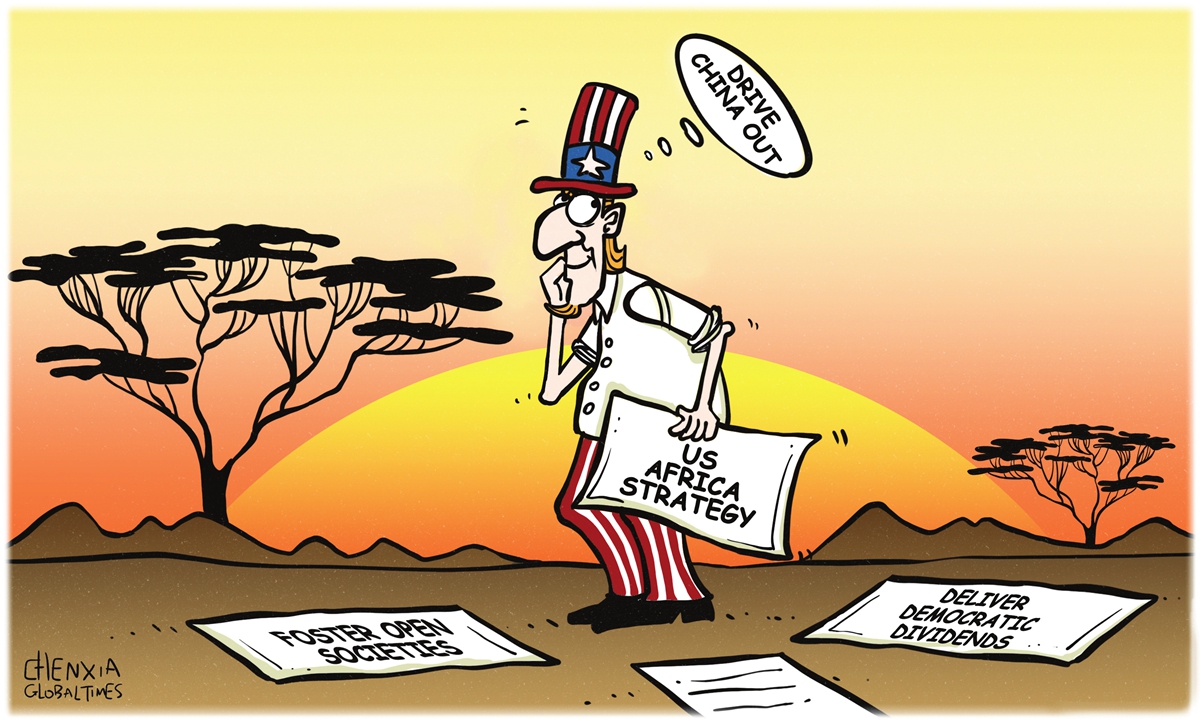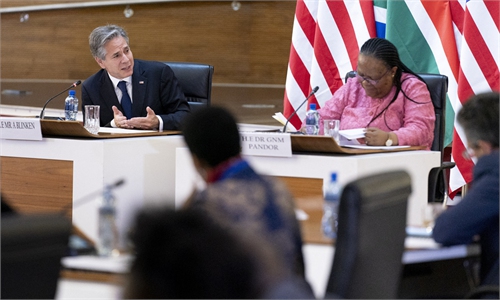
Illustration: Chen Xia/GT
US Secretary of State Antony Blinken gave a speech on the US strategy for sub-Saharan Africa at the University of Pretoria on Monday, on the first leg of his Africa trip. Blinken said the strategy is rooted in "the recognition that sub-Saharan Africa is a major geopolitical force, one that shaped our past, is shaping our present and will shape our future." The White House fact sheet claims that the new US strategy is focused on supporting open and transparent societies, democratic governance, economic recovery from the COVID-19 pandemic, and efforts to mitigate climate change and expand clean energy. However, the strategy aims to use Africa as a pawn to meet US strategic interests and follow US hegemony under the excuse of enhancing Africa's capacity to solve global problems.
Instead of focusing on Africa, the US strategy does its best to discredit China. Behind the strategy is the US belief that China sees Africa as "an important arena to challenge the so-called rules-based international order." Washington points fingers at China when its own policy practice toward Africa meets problems. In recent years, a series of US operations in Africa have seriously harmed the interests of regional countries, leading to a sharp decline in US strategic credibility in the continent.
The US strategy for Africa is self-serving and ignores the needs and realities of Africa. In the new strategy, there is only one symbolic reference to the Agenda 2063 which is the most important document for African development. The indication of "America First" is very strong.
For example, the first goal is to ensure the region remains open and accessible to all, and that governments and the public are able to make their own political choices, consistent with international obligations. The logic behind this goal is that Africa is currently occupied exclusively by other powers and the US is marginalized. Therefore, the US demands Africa to open more so it could have the chance to seek hegemony.
The second goal is to deliver democratic and security dividends for Africa. The new strategy states that the US can provide Africans with democratic and secure options as they determine their future. Clearly, the US has cast itself as the patron saint of democracy and security in Africa, and other countries as bearing bad intentions. But the fact is that since the outbreak of the COVID-19 pandemic, violence and terrorism has spread in the Sahel, while the US and the West are retreating. The new strategy calls for a 21st-century US-Africa partnership, but the US seems to be still sleeping in the imperial dream.
The new US Africa strategy has taken into account criticism from academic and policy circles about the US' past policies toward the continent. Therefore, it deviates from the old thinking of defining US Africa policy based on specific issues, but views the region from the perspective of serving US global strategy. However, what Africa wants is not to be an important geostrategic participant in US strategy that Washington desires it to be. The strategic importance that Africa wants is to enhance its representation and voice in the international order, reform the unreasonable and unjust international order, and shift from the marginalized position in the capitalist world economy to truly gain the right to develop on an equal footing with others. These aims, however, are contradictory to the hegemonic interests that the US wants to maintain. What the US wants is to always marginalize the vast number of developing countries in the world so that the US could maintain monopoly. The US' frantic crackdown on China's development is a typical example.
The US hopes Africa to be an important part in maintaining US hegemony. But obviously, the continent will not become what America wants it to be. Take the Russia-Ukraine conflict. Africa's stance has annoyed the US and the US' wish to defeat Russia in international public opinion has gone bankrupt in Africa.
Africa is the continent of Africans. One must fully understand and respect Africa to gain the trust of the continent. It is unknown how much Africans' opinion has been adopted in the 17-page new US Africa strategy. A document that shouts empty slogans is far from the reality of Africa.
The author is an assistant researcher in the Department for Developing Countries at the China Institute for International Studies. opinion@globaltimes.com.cn


